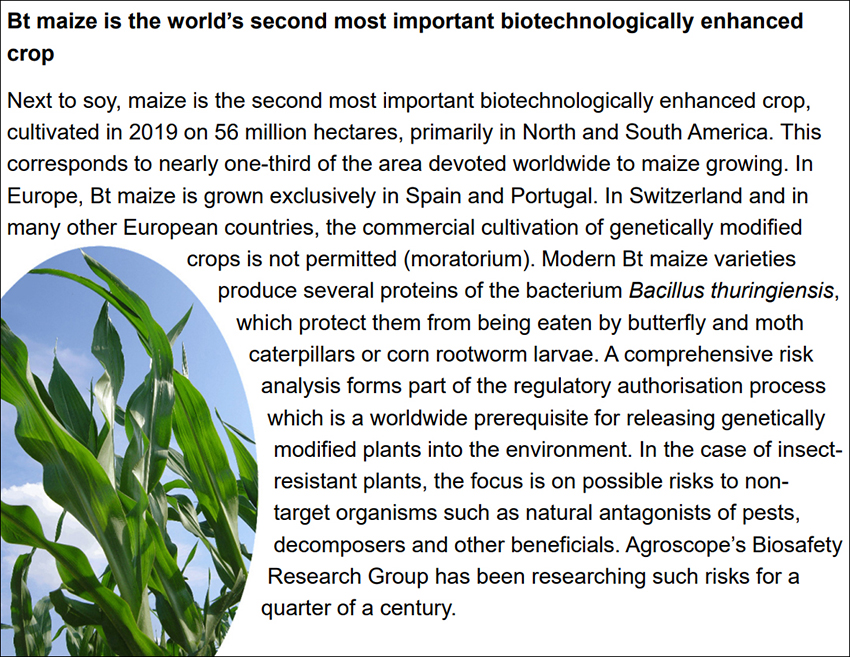Bt Maize Has Minimal Impact on Non-Target Organisms
Photo: Jörg Romeis,
Agroscope
Bacillus thuringiensis (Bt) bacterium proteins protect Bt maize from being fed on by specific insects. A new, systematic analysis of international field data confirms that non-target organisms in Bt maize are largely spared.
Systematic reviews based on statistical meta-analyses make it easier for decision-makers to assess uncertainties regarding the possible effects of genetically modified plants. Agroscope carried out one such study together with the US Department of Agriculture. Researchers investigated whether the cultivation of Bt maize changed the prevalence and function of non-target organisms compared to the cultivation of non-Bt maize. The stringent standards of the Collaboration for Environmental Evidence (CEE) for systematic reviews were met in order to ensure that analyses were as comprehensive, unbiased, transparent, repeatable and robust as possible.
No impact on most groups of invertebrates
The meta-analyses showed no significant impacts of Bt maize on most of the almost forty groups of invertebrates studied. Fewer parasitoids of the European maize borer (parasitic wasps and tachinid flies) were found in Bt maize than in conventional maize. This was to be expected, however, as Bt maize is primarily grown to keep maize-borer caterpillars in check. Some analyses showed lower populations of sap beetles, rove beetles and hoverflies but higher populations of ladybirds, minute pirate bugs and lacewings in Bt maize than in untreated conventional maize. Here, indirect food-web effects or other ecological mechanisms presumably came into play, rather than the toxicity of the Bt proteins.
Greater differences were observed between untreated Bt maize and conventional maize sprayed with insecticides. Predator populations in particular were lower after the application of broad-spectrum pyrethroid insecticides in conventional maize.
The paper corroborates earlier meta-analyses of field and laboratory trials at a global level identifying Bt maize as a selective technology for controlling pests with minimal effect on non-target organisms. This is particularly the case compared to conventional maize when broad-spectrum insecticides are used.
Publicly available data are important
The researchers also investigated whether studies with the involvement of biotechnology firms provided divergent results. It was shown that conflicts of interest apparently had no impact on the publication of data, since negative Bt maize effects tended to result instead from studies with the involvement of industry. Nevertheless, a problem for this study was the limited availability of data that could be used for meta-analyses. The publication of complete datasets together with the scientific publication (open data) is extremely important for future meta-analyses. It is already a requirement of many scientific journals, and corresponds to the basic pillars of scientific integrity of the Swiss universities and the Swiss National Science Foundation.

Conclusions
- The systematic review conducted by Agroscope and the US Department of Agriculture investigated whether the cultivation of Bt maize changes the prevalence and function of non-target organisms compared to the cultivation of non-Bt maize.
- According to the meta-analysis, Bt maize has minimal impact on non-target organisms. This confirms the selective mode of action of the Bt proteins currently used.
- Cultivating Bt maize can lead to reduced application of broad-spectrum insecticides which are often used to control pests in conventionally produced crops.
- The availability of complete datasets is important for meta-analyses. It is already a requirement of many scientific journals, and corresponds to the basic pillars of scientific integrity of the Swiss universities and the Swiss National Science Foundation.
Bibliographical reference
Bt Maize Has Minimal Impact on Non-Target Organisms



